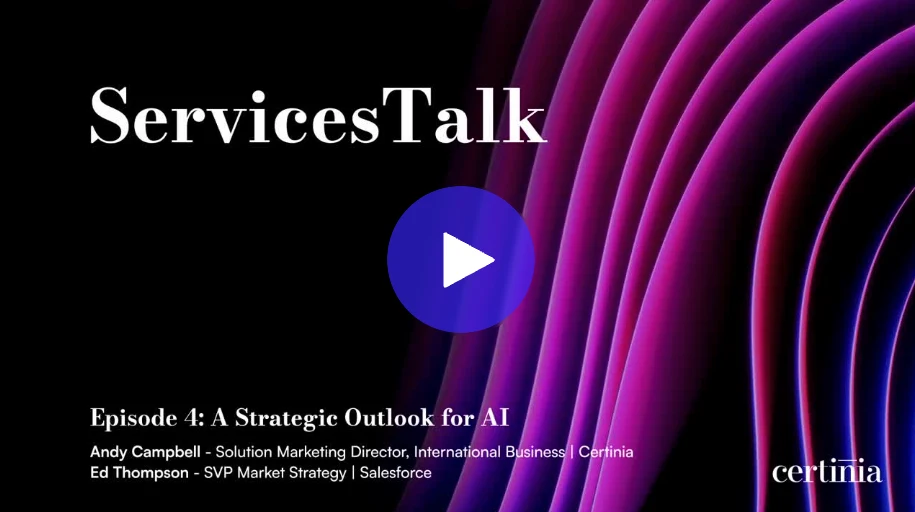The strategic outlook for AI: A conversation with Ed Thompson of Salesforce

The AI market is maturing rapidly, and the opportunities for businesses to leverage this technology are expanding. Certinia recently had an opportunity to discuss this topic with Ed Thompson, Senior VP of Market Strategy at Salesforce, the industry’s leading CRM platform. Following are excerpts from my interview with Ed on the strategic outlook for AI.
Q: Hi Ed, how would you characterize the current state of AI?
A: Honestly, the AI landscape has been chaotic over the past few years. The excitement and apprehension surrounding AI have been tangible, as organizations scramble to grasp its potential. It’s clear that pivotal moments have significantly shaped the AI market. ChatGPT’s release in November 2022 marked a major turning point, catching even seasoned industry experts by surprise and sparking widespread interest and experimentation. Companies quickly transitioned from skepticism to actively exploring AI use cases. And by mid-2023, many organizations had mapped out hundreds of potential AI applications, spanning sales, marketing, customer service, and R&D.
Q: AI seems to have blasted through the hype cycle in record time, yes?
A: Absolutely. At Salesforce, our journey with AI has mirrored the Gartner Hype Cycle, with initial enthusiasm giving way to a more measured approach. Early experimentation saw a high failure rate, with around 80% of AI initiatives falling short. However, things have improved, with success rates now closer to 50%. This progress is due to better tools and a deeper understanding of effective AI implementation.
Q: So how are companies viewing the value of AI now?
A: We’ve seen a significant shift in that regard. Initially, it was all about time savings. Now, the focus has shifted to revenue generation and business outcomes. Organizations are scrutinizing their KPIs to assess AI’s impact on metrics like lead response rates, campaign effectiveness, and overall sales performance.
Some AI applications boast impressive productivity gains of up to 75%; most see a 10% to 20% improvement. This recalibration of expectations is crucial for making informed investment decisions.
Q: Trust and security have been constant concerns in the AI space. Can you speak to that?
A: Well, initially, security issues related to data leakage and vulnerabilities were top of mind. As AI systems matured, though, discussions shifted toward the reliability of AI-generated outputs and broader societal impacts, including ethics and sustainability. Sectors with high regulatory scrutiny, like banking and healthcare, have been more cautious, while others, like retail and hospitality, have adopted a more experimental approach.
Q: Speaking of industry-specificity, which industries stand to gain the biggest benefits from the AI revolution?
A: AI applications offer significant potential for differentiation in areas like drug discovery, chip design, and actuarial risk analysis, which are ripe for innovation. By focusing on high-value employees and providing them with AI tools to enhance productivity, companies can unlock substantial value. Automating routine tasks for car designers or researchers can free up their time for more strategic activities, leading to greater overall impact.
Q: Looking ahead, what is the key to success in adopting AI?
A: Balancing short-term wins with long-term strategic goals is essential. Smaller organizations can benefit from off-the-shelf AI solutions that provide quick returns without significant upfront investment. Larger enterprises have the resources to build and customize AI models tailored to their specific needs.
The AI market is maturing, and the opportunities for businesses to leverage this technology are expanding. Whether through off-the-shelf solutions or custom-built models, the key is to start experimenting, measure the impact, and refine the approach to discover what works best for the organization. As AI continues to evolve, it will not only improve productivity but also pave the way for new business models and competitive differentiators. The journey is just beginning, and those who embrace it with a balanced approach will reap the rewards.
Thank you, Ed, for sharing your insights.
To view the full, 20-minute discussion with Ed Thompson, click on the video“ServicesTalk: A Strategic Outlook for AI,” video image below.
Maximize your Salesforce investment with Certinia


